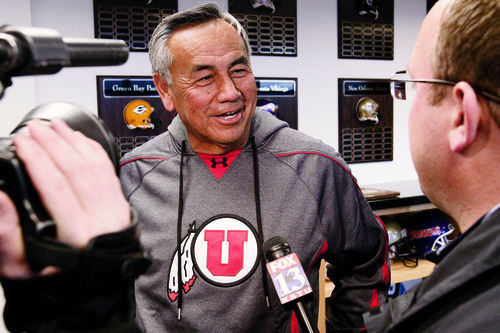This is an archived article that was published on sltrib.com in 2011, and information in the article may be outdated. It is provided only for personal research purposes and may not be reprinted.
Fans were filing into the stadium, and Brandon Doman was nervous. For the first time, BYU's offensive coordinator would be calling plays in front of a crowd.
Doman managed to get through the Blue-White scrimmage that day. Once the Cougars' actual season began in September, it was another story, as his offense struggled.
After four games, BYU ranked 111th in the country in total offense — yes, even worse than Utah's current standing. Yet via some combination of a softening schedule, quarterback Riley Nelson's impact and Doman's growth, the Cougars have improved steadily.
The state's three Football Bowl Subdivision teams are headed to postseason play, from different directions. Each used two quarterbacks extensively, out of choice or necessity, and either thrived (Utah State) or merely survived (Utah) offensively, with BYU somewhere in between those descriptions.
A review of the offensive coordinators' performances:
Brandon Doman, BYU
In September, no evidence suggested that Doman was an upgrade over Robert Anae, his predecessor. As the season played out, it became apparent that some of his offense's initial troubles could be attributed to the opponents: Texas, Utah and Central Florida. Mississippi's defense, however, ranks last in the Southeastern Conference.
The Cougars faced only one top-50 defense (Texas Christian's, No. 45) in October and November, tempering their growth. Yet Doman's offense has reached a 400-yard average and should increase that figure in the remaining two games.
That's an improvement over Anae's 366-yard production of last season, after which coach Bronco Mendenhall reorganized the offensive staff. Mendenhall endorsed Doman's progress, saying, "I think he's just gained confidence."
Grade • B
Norm Chow, Utah
Chow is one of the most celebrated coordinators in college football, but his offense had to earn everything it got this season. The loss of quarterback Jordan Wynn to a shoulder injury in the second quarter of the fourth game was devastating, considering the program's staffing of the position.
Chow built his offense around running back John White, while fill-in QB Jon Hays somehow is 5-3 as a starter. Regardless of who plays quarterback, Utah's success or failure is no mystery. In seven victories, White averages 166 rushing yards. In five defeats, he averages 48 yards. The Utes suffered when White was injured in the second halves of losses to USC and Colorado, but he was ineffective in those games anyway.
The Utes stand 110th in total offense. It is a compliment to Chow, and Utah's defense and special teams, that the 10 teams ranked below them have a combined 25-91 record.
Chow deserves credit for creatively finding ways for White to succeed — "pulling stuff out of the back pocket," said offensive tackle Tony Bergstrom — against defenses geared to stop the run. Then again, the Utes' four consecutive Pac-12 wins came against defenses ranked 81st or worst, and they scored 14 points or fewer in their five defeats.
And producing only 39 first-half yards against Colorado's 103rd-ranked defense significantly downgrades Chow's performance, which otherwise has been admirable under the circumstances.
Grade • C+
Dave Baldwin, Utah State
Utah State fans may never forgive Baldwin for a series of late-game offensive shortcomings in September and October.
Most memorably, the Aggies failed on a two-point conversion attempt in double overtime against Colorado State and did not record a first down while holding a four-point lead over BYU.
Yet USU's defense ultimately was responsible for losing fourth-quarter leads in all five losses. In November, with starting quarterback Chuckie Keeton injured, Baldwin's offense rallied behind backup QB Adam Kennedy to win in the final minute or overtime of three straight games, then produced a clutch drive to finish Saturday's victory over Nevada.
Statistically, the Aggies may have the country's most improved offense. They've jumped from 84th in 2010 to 24th, averaging 453.5 yards with two games left. The return of running back Robert Turbin, who missed last season with a knee injury, obviously made a huge difference.
Grade • A-
Offensively speaking
Statistics for Utah schools of the past two seasons, with national ranking:
2011
Team Yards Rank
Utah State 453.5 •24th
BYU 400.0 45th
Utah 308.6 110th
2010
BYU 366.4 73rd
Utah 389 •.0 •52nd
Utah State 347.3 •84th



